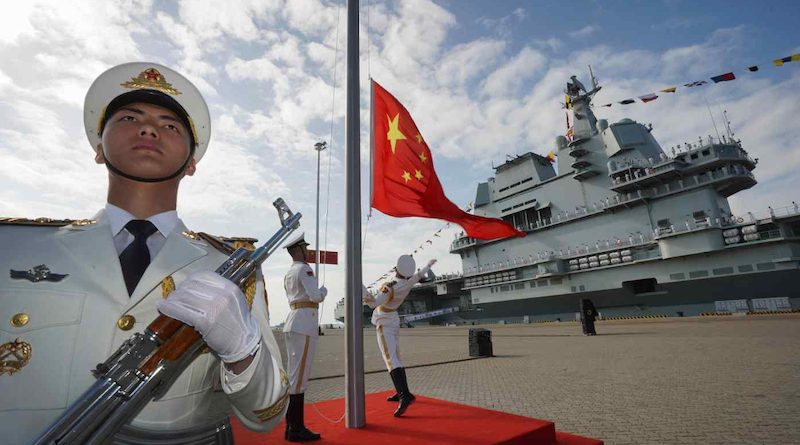Ukraine war will make China think twice about invading Taiwan
By Adm. James Stavridis, dean emeritus of the Fletcher School of Law and Diplomacy at Tufts University
As the dust settles from the 20th National Congress of the Chinese Communist Party and Xi Jinping’s ascension to an unprecedented third term as general secretary, Beijing’s view of the unfolding Russian invasion of Ukraine is taking on growing geopolitical significance.
What does Xi think about the debacle into which his friend President Vladimir Putin has stumbled? Are there, in fact, limits to the “partnership without limits” that the two leaders declared early this year just before the war began?
As a former supreme allied commander of NATO, I am often asked if the invasion of Ukraine will ultimately encourage the Chinese to make a military move on Taiwan. There is a certain symmetry in how both Ukraine and Taiwan are seen as breakaway regions of their respective, far larger neighbors.
But ultimately, a military incursion looks unlikely at this time because as China looks at the Ukraine conflict, three key questions must emerge.
The first is quite simple: How would the Chinese military perform in large-scale, challenging combat operations? Put another way, Xi must be asking himself if his generals and admirals — trained in the old Soviet model like their Russian counterparts — would fare any better in actual combat?
The Chinese are well aware that their military has not engaged in sustained combat since the Korean War, in the early 1950s. War is unpredictable, to say the least, and without the harsh experience of large-scale combat, which an invasion of Taiwan would certainly entail, how an attack on Taiwan might unfold is an uncertainty for China.
For better or worse, the U.S. has a highly bloodied military, having conducted major combat operations in Vietnam, the Persian Gulf, Iraq and Afghanistan, as well as many smaller operations. The answer to how the Chinese military would perform in actual combat is an unknown.
A second question involves the Taiwanese. Would they fight as hard and effectively as the Ukrainians have? Again, this is a hard question to answer with certainty, but having met President Tsai Ing-wen and her senior military leadership team, I believe they would fight hard and well.
While the question of full-blown U.S. intervention is still shrouded in “strategic ambiguity,” despite several comments by President Joe Biden indicating Washington would provide direct military assistance, it is a near certainty that the U.S. and its allies would, at a minimum, offer material assistance to the Taiwanese in the form of advanced weapons, including anti-air defenses, smart sea mines, cyber tools and anti-ship cruise missiles.
Supported by the West in terms of military equipment and economic sanctions against Beijing, the Taiwanese would probably fight hard.
Again, the level of their resistance is an unknown for China and a concerning one. Like the unknown Beijing faces about the ultimate combat quality of the People’s Liberation Army, the level of fighting spirit of the Taiwanese will not be clear until a military confrontation actually unfolds.
Finally, Beijing has to wonder whether the West would impose as severe sanctions as they have against Russia. From the Chinese perspective, Beijing reasonably judges that its economy, at around 17% of global gross domestic product, is too big to sanction.
In military terms, trying to apply a carpet bombing economic approach to China with massive, broad sanctions is probably unmanageable, given how intertwined the world’s economies are today. Unlike Russia, which has a much smaller GDP and is really only a factor in hydrocarbon markets, Beijing is deeply embedded in every element of the global economy.
But instead of trying to carpet bomb the Chinese economy, could the West choose to conduct precision-guided strikes on critical elements of Chinese supply chains?
Probably. The new U.S. CHIPS and Science Act is a small foretaste of what a cleverly structured package of sanctions could look like on high-tech electronic components, key raw materials, finely machined tools and other critical items. What shape such sanctions could take is a third and highly concerning unknown for Xi.
Taken together, these three uncertainties will probably create a reluctance to conduct a full-on military intervention against Taiwan for at least the next three to five years. An exception would be if Taipei crossed the ultimate Chinese red line and declared independence, something that appears highly unlikely.
Over the longer term, China may become more confident in its military as its forces accrue more and better hardware, perhaps conduct more out-of-area military operations and build a sustainable network of overseas bases like the U.S. enjoys today. Beijing will harden its critical supply chains. And it is closely following events in Taiwan, seeking to find clues as to the willingness of the Taiwanese to fight.
All remain uncertainties today. So, for now, until leaders gain more knowledge in all three areas, the view from Beijing, given the level of uncertainty of the outcome, will be one of avoiding military intervention against Taiwan.
This piece is republished from Nikkei Asia.

